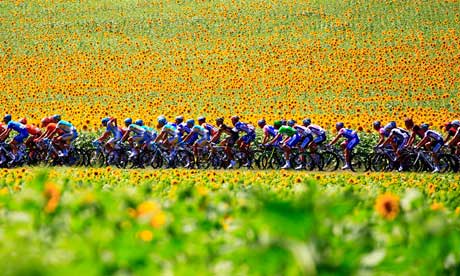
Who would have thought that something so simple could take us so far? In 1839, when Scottish blacksmith Kirkpatrick Macmillan came up with a two-wheeled machine that was powered simply by the action of moving your legs up and down, he would have had little idea that nearly 200 years later we would still be riding around on something that's largely the same design.
OK, so some of today's bikes may have umpteen gears, clipless pedals and parts made out of lightweight carbon fibre, but essentially they are unchanged from the first rudimentary designs that emerged in the early 1800s.
For decades Macmillan was widely acknowledged as the inventor of the bicycle, but recently that's become disputed by cycling historians.
Some point to 1817, when a German civil servant, Karl von Drais, created a bicycle without pedals called the draisine. Rather like wooden balance bikes used nowadays to teach kids how to ride, it required you to scoot your feet along the floor in order to go anywhere.
However, even the claims of the draisine have been called into question. Italian experts argue that a 15th-century sketch by Gian Giacomo Caprotti – a pupil of Leonardo da Vinci – constitutes proof that it was actually the Italians who invented the bike. Or at least the principle of it.
Whoever you believe, there is one thing we can all agree on: for anyone who has ever swung their leg over the saddle and hit the open road, there is nothing quite like a bike for giving you absolute freedom. No fuel necessary, no special training and no licence required. While the bicycle's early years may be somewhat murky, from the late-1800s onwards it is a lot more straightforward. One slight evolutionary detour was the penny-farthing, the high-wheeled accident-waiting-to-happen, which became the preferred steed of choice for adventurous young men from 1870 to 1890 before they realised how bonkers it was.
By the time 1890 rolled around, though, the bike had become established as a viable mode of transport thanks to the arrival of the Rover safety bicycle. Designed by John Kemp Starley, this was the first modern bike as we know it, featuring equal-size wheels and handlebars that made it easy to steer.
What's more, with mass-production processes making them cheaper and easier than ever to produce, bikes became something that everyone could enjoy – and it wasn't long before people began racing each other.
While arguments still rage about who invented the bicycle, few can dispute the winner of the first ever race. In 1868 Englishman James Moore pedalled his wooden-framed, iron-wheeled steed to victory in a 1,200-metre dash at the Parc de St-Cloud in Paris, going on to become a star in the cycle racing world.
By the start of the 20th century there were cycling clubs and races springing up all over Europe, as people pushed the boundaries of distance and speed. In 1903 the most famous race of all was born: the Tour de France.
Bizarrely, Le Tour was actually conceived by a newspaper reporter, Geo Lefèvre, as a publicity stunt for selling more copies of the sports paper L'Auto; the editor, Henri Desgrange, became the event's inaugural organiser.
Riders competed at night in a series of epic stages that took them from Paris down to Marseilles on the south coast, then back to Paris via Bordeaux and Nantes. In comparison with today's 100-or-so-mile instalments, each leg of the original tour ranged from a massive 200-300 miles. What's more, cheating was rife – with riders being beaten up en route by rival fans.
Despite its somewhat "wild west" origins, however, there was something about the Tour de France that captured people's collective imagination. Before long, other epic races started appearing on the calendar including the Giro d'Italia, which is also still going strong.
Over the years there have been various British heroes of the sport, including the 1965 road race world champion, Tom Simpson, and multiple-Tour de France stage winner Chris Boardman. But never have Brits been such a force to be reckoned with as they are right now.
In recent years we have seen British riders dominating the international track-racing scene. At the Beijing Olympics in 2008 Team GB won seven out of a possible 10 gold medals, with the likes of Sir Chris Hoy and Victoria Pendleton becoming household names.
On her BMX, Shanaze Reade has won the World Championships three times in the past five years. And on the road we have witnessed Mark Cavendish collect a whopping 20 Tour de France stage wins since 2008 – along with the green sprinter's jersey and the World Road Race Championship title in Copenhagen last year. This season sees Cavendish, the reigning BBC Sports Personality of the Year, join Team Sky alongside Bradley Wiggins, whom many are predicting to win this year's Tour.
So whether you are a shaven-legged, Lycra-wearing, hardcore road racer, or simply enjoy a Sunday afternoon pootle, there's never been a more exciting time to get out on your bike. And with Sky and British Cycling teaming up to organise a range of free rides around the UK this summer (see below), it has never been easier to get involved …
• This content was Produced for Guardian Brand Partnerships by Seven Plus to a brief agreed with Sky and paid for by Sky

